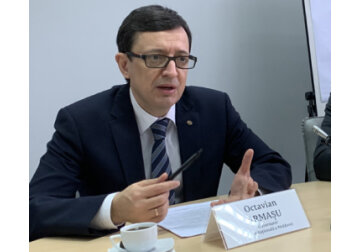
The NBM raised the base rate applied to the main short-term monetary policy operations by another 3 percentage points - from 12.5% to 15.5% per annum.
This decision was made by the National Bank at a meeting of its Executive Committee on May 5. In addition, interest rates on overnight loans and deposits were also increased by 3 percentage points - from 14.5% to 17.5% and, accordingly, from 10.5% to 13.5% per annum. At the same time, for the subsequent reserve period - from May 16 - it is planned to increase the norms of required reserves from funds attracted in lei and convertible currency by 2 percentage points - from 28% to 30% of the calculation base, and for funds raised in freely convertible currency - by 3 p.p. - from 30% to 33% of the settlement base. As President of the National Bank Octavian Armasu said at a press conference on Thursday, the decision on monetary policy is based on a new inflation forecast made in the context of the effects of the pandemic crisis and the war in Ukraine, which have seriously affected the socio-economic situation in Moldova and around the world. The head of the National Bank clarified that inflationary processes are based on the growth of world prices for energy resources and food, as well as problems that are typical only for our country due to the dependence of local supply chains on economic agents from Ukraine. They were caused by the post-pandemic crisis and reinforced by the war in Ukraine. “Thus, the forecast shows that inflation will be higher and more stable and require more restrictive monetary policy measures, which will create conditions for a return to equilibrium and potential economic growth,” Octavian Armasu said. According to him, the decision taken by the NBM is aimed at easing inflationary pressure, fixing inflationary expectations, protecting the savings of the population, in particular, stimulating the growth of rates on bank deposits and, as a result, maintaining financial stability. The head of the National Bank drew attention to the fact that primary inflationary shocks also cause side effects, especially due to significant adjustments in utility tariffs, especially in cases where decisions to increase were not made in a timely manner. He noted that in the context of the above, the National Bank of Moldova, like other central banks, including many countries with developed economies, is tightening monetary policy measures. “These decisions are necessary to prevent much more painful consequences in the future and to avoid the spread of poverty among the population. Moreover, Moldova is a small country with an open economy, so it is vulnerable to very strong outside influences,” Octavian Armasu said. He stressed that the NBM will continue to closely monitor the development of inflation components and factors that may affect its dynamics, as well as extraordinary risks and uncertainties caused by the war in the neighboring country. The National Bank of Moldova is ready, if necessary, to intervene with the necessary measures. "At the same time, the NBM monitors the situation in the banking system of Moldova, which is stable and viable, and foreign currency reserves remain at a comfortable level to further ensure the financial stability of Moldova," Octavian Armasu stressed.He noted that the second Inflation Report for the current year will be published by the National Bank on May 13. Answering a question from the InfoMarket agency, the head of the NBM stressed that the increase by the National Bank of the base rate applied to the main short-term monetary policy operations by 3 percentage points at once is a fairly large step, and the NBM has not resorted to such rates of increasing the base refinancing rate for quite a long time . “We believe that such an increase in the base rate is enough for now, because its too rapid increase and on a large scale can already cause other shocks. We decided to raise the rate by 3 percentage points, we will follow, monitor the spread of this decision, we will follow the evolution of the situation in the economy, the market and then we will make appropriate decisions in the future,” the head of the NBM said. He stressed that he understands the concerns of businesses about raising the base rate, but these measures are taken precisely in order not to end up in a situation of stagflation, when there is little or negative economic growth, and high constant inflation. “This is exactly the scenario we want to avoid. Inflation itself is already quite high and continues to rise. It puts great pressure on economic growth, and if we don’t stop it, if we don’t contain it, it can become permanent, create a chain of economic processes that will generate inflation that will generate another inflation, and then we will find ourselves in a situation of stagflation,” Octavian Armasu said. According to him, the tightening of monetary policy leads to an increase in rates in the market, but this is what the NBM is striving for a limited period of time in order to stop inflationary processes and after spillovers on the market are visible, the National Bank will resort to loosening monetary policy to support for economic growth. "But it will be when we see that we have managed to stop inflationary processes within the second round," the head of the NBM stressed. “We understand that our decisions on monetary policy produce effects that are not only pleasant, sometimes they are painful. But we need to understand that if we do not implement these solutions now, then the subsequent price that will have to be paid in the future will be very high. And we want to avoid this. We are paying the same price now to have stability in the future,” concluded the President of the National Bank. It should be noted that the current increase in the base rate applied to the main short-term monetary policy operations is already the fourth this year. Three previous times it increased by 2 percentage points: January 13 - from 6.5% to 8.5% per annum, February 15 - from 8.5% to 10.5%, March 15 - from 10.5% to 12.5% per annum. // 05.05.2022 - InfoMarket







